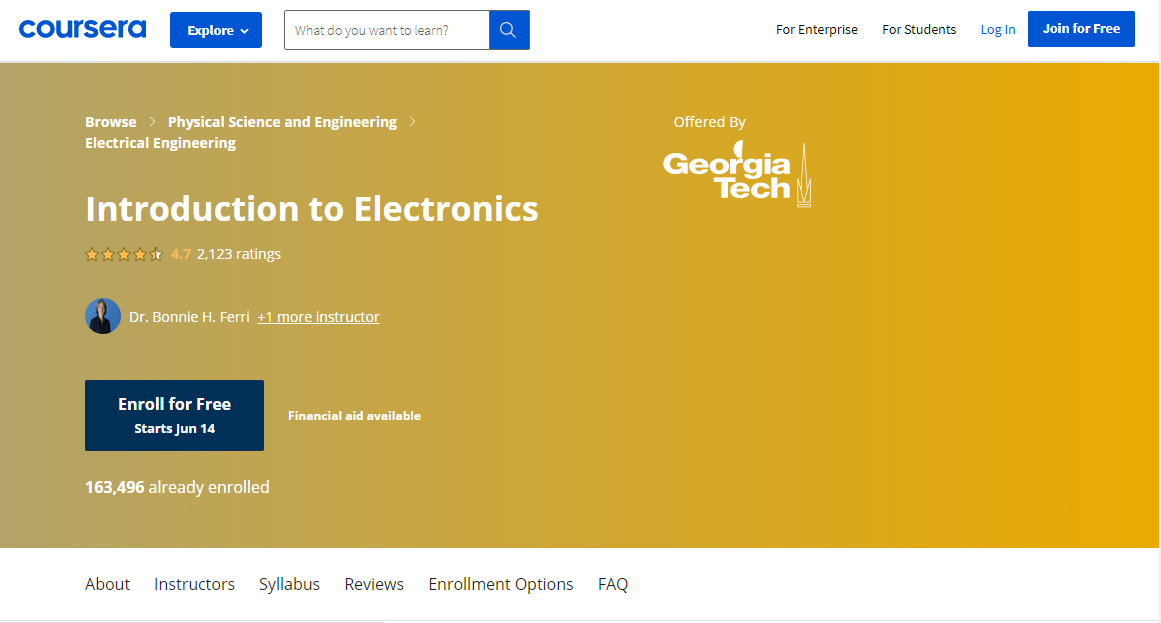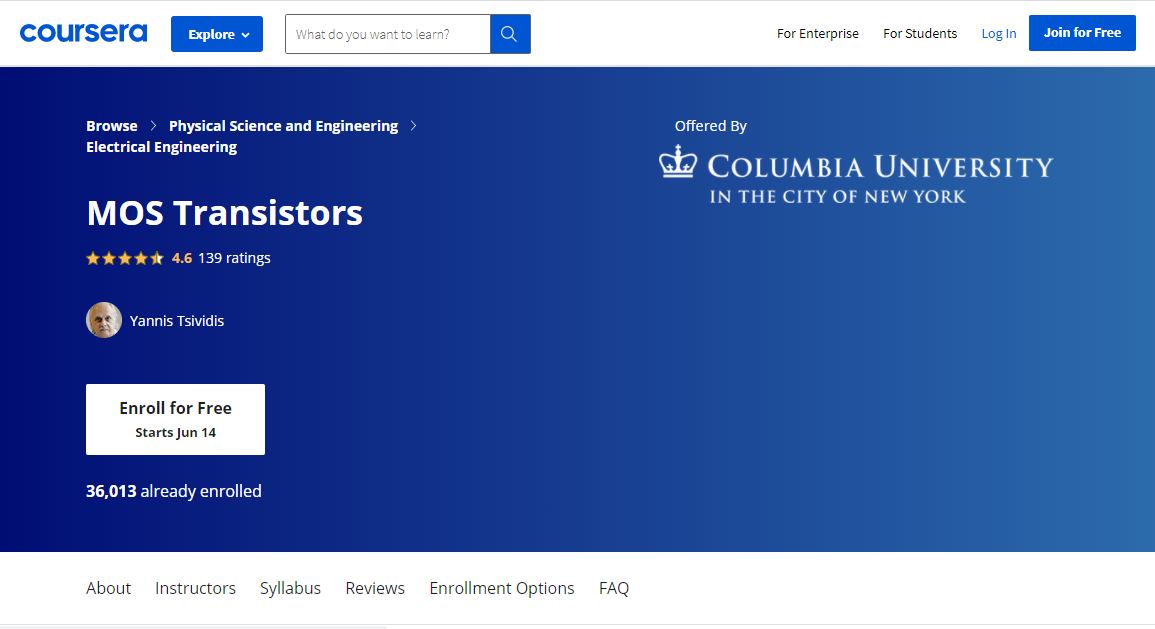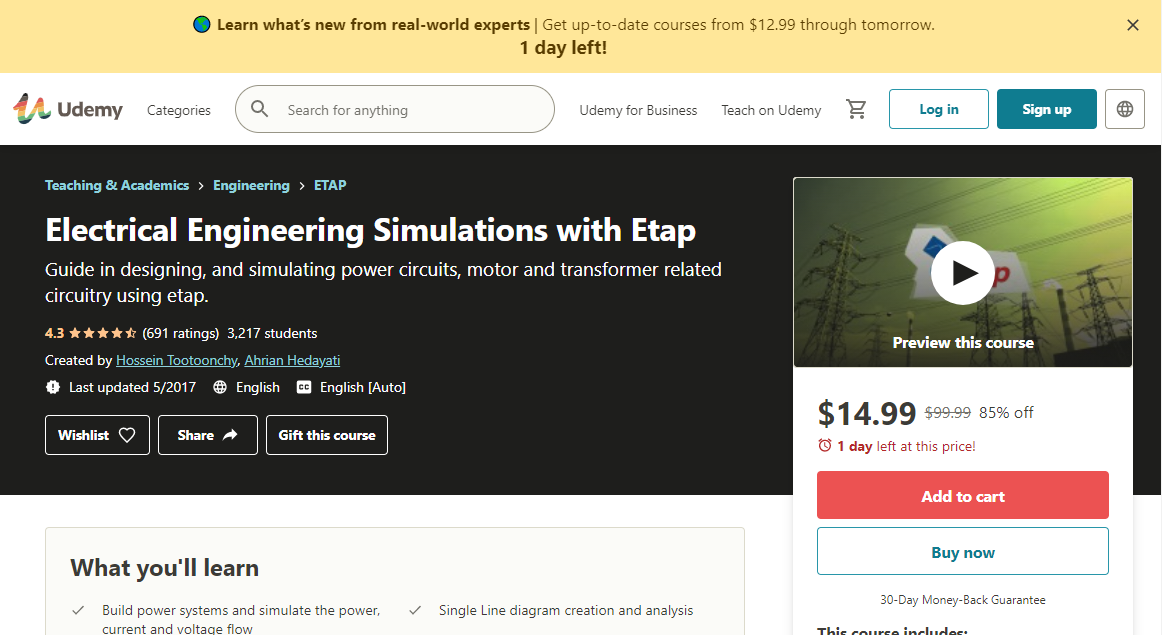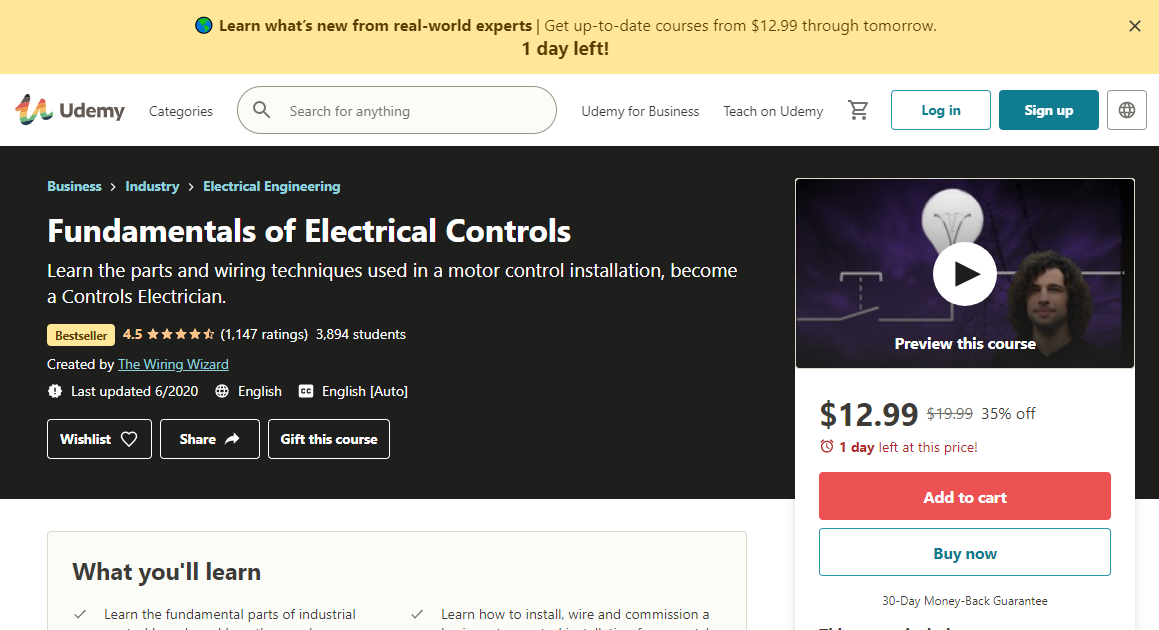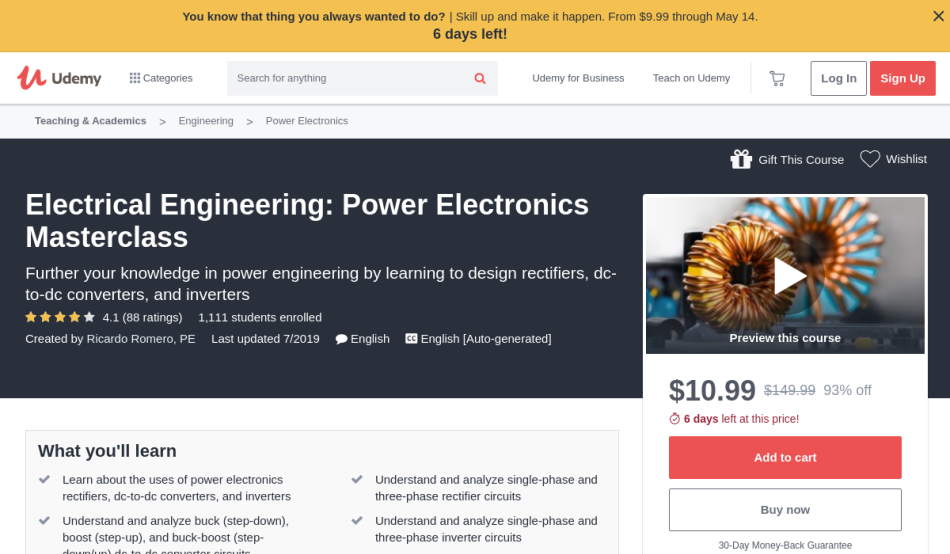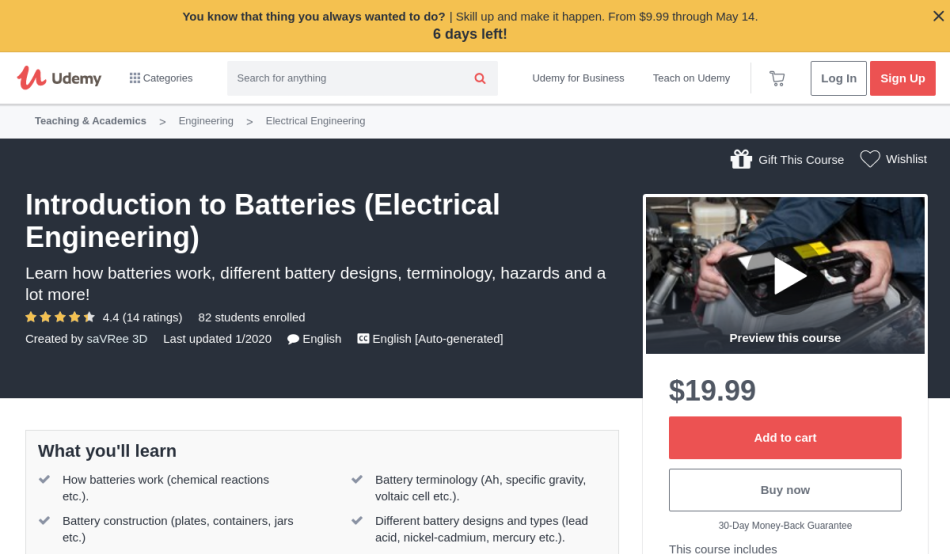Best Electrical Engineering Courses
All topics are curated by you, the community. Free from editorial bias, 100% independent. Upvote your favorite items, propose missing ones and shape the ranking of this topic.
A degree in electrical engineering is a qualification that is needed for an individual to become a successful electrical engineer.
The courses will teach you how to design, develop and maintain the infrastructure for power generation, distribution and supply. You will learn about the different types of electrical equipment and how they are used in industry. Electrical engineers are responsible for designing and installing all kinds of electricity generating equipment, from power station turbines to domestic appliances.
They also design wiring systems and the control systems that run them.
-
Offered By Georgia Institute of Technology
About this Course
This course introduces students to the basic components of electronics: diodes, transistors, and op amps. It covers the basic operation and some common applications.
Article from: https://www.coursera.org/learn/electronics#about
-
Offered By Columbia University
About this Course
PLEASE NOTE: This version of the course has been formed from an earlier version, which was actively run by the instructor and his teaching assistants. Some of what is mentioned in the video lectures and the accompanying material regarding logistics, book availability and method of grading may no longer be relevant to the present version. Neither the instructor nor the original teaching assistants are running this version of the course. There will be no certificate offered for this course.
Learn how MOS transistors work, and how to model them. The understanding provided in this course is essential not only for device modelers, but also for designers of high-performance circuits.
Article from: https://www.coursera.org/learn/mosfet
-
Guide in designing, and simulating power circuits, motor and transformer related circuitry using etap.
What you'll learn:
- Build power systems and simulate the power, current and voltage flow
- Single Line diagram creation and analysis
- Run and Analyze AC power circuits
- Run load flow analysis on one line diagram
- Run Short Circuit analysis and Arc-Flash
Requirements
- This course requires the etap software
Description
This course offers Coursovie Training Certificate in addition to Udemy Certificate. Coursovie Certificate is FREE and requires registration on Coursovie Website.
ETAP is the most powerful software in the area of Electrical Power systems. Using this software you can design and analyse your power system from the source of power all the way to the loads connected to it.
ETAP offers a suite of fully integrated electrical engineering software solutions including arc flash, load flow, short circuit, transient stability, relay coordination, cable ampacity, optimal power flow, and more.
Having the ability to work with this software will play a key-role for fresh out of school Electrical engineers, as well as those who need to expand their knowledge of power calculations in being awarded internships into top electrical power based companies.
This course is structured into 9 chapters with multiple practical examples after the theory is elaborated. We have created a great course that enables the researchers, engineers, and students to learn ETAP in less than a Week !
Who this course is for:
- Electrical Engineers
- Electrical Major Students
- Researchers and Teacher Assistants
- Junior Electrical Engineers
Article from: https://www.udemy.com/course/practical-etab/
-
Electronics circuits including: Direct current (DC), alternating current (AC), digital circuits (DigC), and solid state.
What you'll learn
- Understand and apply safety rules when working with electronic circuits and devices.
- Understand and apply the principles of design and operation of Direct Current (DC) circuits and devices.
- Understand and apply the principles of design and operation of Alternating Current (AC) circuits and devices.
- Understand and apply the principles of design and operatoin of Digital (Dig) circuitsa and devices.
- Understand and apply the principles of design and operation of Solid State circuits and devices.
- Design and simulate basic DC circuits and applications
Requirements
- Basic algebra
- Basic trigonometry
- Ability to read and write in English
Description
This course introduces fundamental principles and concepts in electrical and electronics engineering technology including Safety, Direct Current (DC), Alternating Current (AC), Digital, and Solid state electronic circuits.
This course provides lecture notes, videos lectures and quizzes to test your understanding of the concepts presented.
It takes about 2-3 hours to go through all 15 plus course lectures or approximately 15 minutes per lecture.
The course presents a sequence of topics from simple concepts to intermediate ideas.
If you always wanted to understand the fundamentals of applied engineering electronics, this course is for you.
Now includes circuit design and computer simulation demos.
By the end of this course, the students will:
Understand Direct Current Circuits.
DC Basic circuits, series circuits, parallel circuits, series-parallel circuits.
Explain Alternating Current Circuits.
AC DC Basic circuits, series circuits, parallel circuits, series-parallel circuits.
Recall Digital Logic Circuits.
All Basic logic gates: Not, Or, And, Nor, Nand, Xor, XNOR
Remember Solid State Basic Circuits.
Basic diodes types and circuit types.
There is also section reviews to reinforce the concepts presented.
There is also evaluations in the form of quizzes and test to further fix information.
There is also demonstrations and simulation exercises to further understand the concepts studied.
More than 20 video lectures consisting of more than 2 hours of lecture materials.
Who this course is for:
- Engineering and technology freshman students or anyone at that level.
- Hobbysts desiring to gain fundamental understanding of electronics.
- Anyone desiring to learn fundamental concepts of applied electronics engineering.
Article from: https://www.udemy.com/course/electronics-engineering-technology-fundamentals/
-
Learn the parts and wiring techniques used in a motor control installation, become a Controls Electrician.
What you'll learn:
- Learn the fundamental parts of industrial control boards and how they work.
- Learn how to install, wire and commission a basic motor control installation from scratch.
- Learn how to fault find, repair and maintain a basic motor control systems.
- Learn how electrical control components work and how to wire them up.
Requirements
Some prior knowledge of electrical circuits would help but it's not critical.
Description
This course is an introduction to electrical controls with an emphasis on motor controls in the real world.
In this course, we focus on industrial and commercial installations, we will start with the absolute basics of electrical circuits. We look at the fundamentals of resistive circuits, and introduce Ohms Law, a mathematical formula that all electricians learn. The course looks at the different types of voltages and where they come from in the real world, focussing on transformer formations from the power supply authority, and AC and DC Voltages. As this is a course on the fundamentals of electrical controls, we will go through the basics of control circuits such as, normally open and normally closed, and look at how controls are made up of series and parallel circuits.
Taking a more practical approach to the subject, we dive inside control panels and look at each electrical component that we will be using later in the course, in our own motor control installation. We look inside the parts in detail and see how they work, discuss ratings, and learn how to size them up, with a particular focus on contactors and overloads. We also simplify an explanation of how an asynchronous motor works.
Before we get to wiring up our own control circuit, we look at the different types of control voltages in the real world and follow them from end device at the customers installation all the way back to the supply transformer at the power company, so we can see how a full installation might look, and get an insight into different systems that we might find in industry.
After learning the basics, we look at how we would install a motor control installation from scratch, including the motor itself. We get to see all the parts that we have learned about, working together in a mock real world installation, we learn how to size up the components and then go through the wiring of the circuit step by step. Part of installing a control board is commissioning it, so we go through the operation of the circuit after we have installed it to make sure it works.
Installations are often amended and modified in the real world, so we'll look at a few ways in which we could modify our mock installation, change our wiring around and re-commission the installation.
At the end of the course, we're going to challenge ourselves, and learn how to fault find a circuit as we would if we were called to a breakdown as an electrical controls technician. We'll go through a few faults that we might come up against in the industry and look at how we might repair them. We also briefly touch on preventative maintenance techniques and discuss why they are important, for safety reasons and also financial reasons too.
Controls can be quite daunting and complicated, we will go through slowly and steadily, learning each part of the installation in detail before putting it all together, the course is weighted towards learning from practical examples, perfect for those of us that are visual learners. And, instead of enforcing hard and fast rules of how things must be done, We focus more on learning how to break down circuits and understand them for ourselves. I will show you wiring techniques used by Controls Electricians in the real world.
What is covered in the course:
- Learn the fundamentals: AC and DC voltages, 3 phase voltages, resistive circuits, ohms law, normally open and normally closed, series and parallel circuits, supply transformers (star & delta), faults to earth.
- Electrical components: Control panels, isolating switches, circuit breakers, fuses, contactors, overloads, asynchronous motors, push buttons, indicator lights, power supplies.
- Types of installations: Single phase, dual phase, power supply, mixed voltage control.
- Installation of a motor control circuit: Install electrical components, wiring of a mock installation, commission installation.
- Modifying an installation: Add and remove components, wire a hold in circuit, commission.
- Fault finding and maintenance: Fault find and repair, use a multimeter, preventative maintenance.
Are you ready to upskill?
Who this course is for:
- People interested in becoming an electrician.
- Pre-apprentices interested in learning motor controls.
- Apprentices that want to learn the basics of motor controls.
- Residential electricians that want to brush up on the motor control basics.
Article from: https://www.udemy.com/course/fundamentals-of-electrical-controls/
-
Further your knowledge in power engineering by learning to design rectifiers, dc-to-dc converters, and inverters.
What you'll learn:
- Learn about the uses of power electronics rectifiers, dc-to-dc converters, and inverters
- Understand and analyze single-phase and three-phase rectifier circuits
- Understand and analyze buck (step-down), boost (step-up), and buck-boost (step-down/up) dc-to-dc converter circuits
- Understand and analyze single-phase and three-phase inverter circuits
Requirements
- Basic knowledge of semiconductor devices
- Basic understanding of electronic circuit analysis
Description:
This course is designed to provide a complete overview of one of the main areas of electrical engineering and power engineering: power electronics. The three main types of power electronics devices (i.e., rectifiers, dc-to-dc converters, and inverters) are discussed in detail in the lectures. For each device, the ideal circuit is discussed along with different circuit topologies to provide a wide range of practical uses.
By learning how rectifiers, dc-to-dc converters, and inverters are designed, you will learn the fundamentals for designing your own power electronics devices, such as battery chargers, switched-mode power supplies, solar inverters, and variable frequency drives, among others.
Throughout the course, practical numerical problems are solved to aid your understanding of power electronics. Additionally, the course includes 5 quizzes with a total of 15 questions. Three articles are also provided so you can learn by reading as well as videos.
Remember that Udemy offers a 30-day money-back guarantee. I am also always available for questions while you go through the course to ensure everything is clear.
Who this course is for:
- Electrical engineering students planning to enroll or currently enrolled in a power electronics course at a university
- Electrical engineers looking for a refresher course on power electronics
- Electronics enthusiasts looking for an introductory course on power electronics
-
Start your career in electrical & electronics engineering by learning everything about electric circuits and electronics
What you'll learn:
- Electrical Engineering fundamentals
- Electronics fundamentals
- What are electric circuits and electronics and the fundamental quantities in circuits like voltage and current
- The differences between direct current (DC) and alternating current (AC)
- What resistors, capacitors, and inductors are and how they are used in electric circuits and electronics
- Sources of electricity in electric circuits and electronics
- Simplification of resistive, capacitive, and inductive circuits
- Basic electric circuit analysis techniques using Kirchhoff's voltage and current laws, nodal analysis, and loop analysis
- Advanced electric circuit analysis techniques such as the superposition theorem, Thévenin's theorem, and Norton's theorem
- Analysis of first-order electric circuits during transients
- Electric circuit analysis techniques used in different electrical engineering and electronics engineering fields, such as analog electronics, digital electronics, and power electronics
- Electric circuit analysis techniques needed for developing electronics with development boards such as the Arduino or Raspberry Pi
Requirements
Basic knowledge of algebra
Description
This course is designed to provide a complete overview of electric circuit analysis used in electrical engineering and electronics engineering. Electric circuit analysis is the most fundamental concept for electrical engineering, electronics engineering, and computer engineering. It is for that reason that electric circuit analysis is usually the first course taught in electrical, electronics, and computer engineering programs at universities, as basically anything related to electrical, electronics, or computer engineering stems from electric circuit analysis.
In this course you will learn everything about electric circuits and electronics, from the basics such as what an electric circuit is and the fundamentals of electrical quantities like voltage, current, and power, all the way to complex techniques for analyzing electric and electronics circuits. The course is roughly divided into the following sections:
1. Fundamentals of Electric Circuits and Electronics: in sections 2 and 3 of the course, we will discuss what an electric circuit is at the most basic level, followed by explanations of electrical quantities and sources of electricity. This is the foundation for electrical engineering and electronics engineering.
2. Basic DC Electric Circuit Analysis: in sections 4, 5, and 6 we will discuss the analysis of direct current (DC) circuits, starting from basic analysis techniques such as Kirchhoff's voltage law and Kirchhoff's current law (KVL and KCL), voltage division, current division, nodal analysis, and loop analysis. We will also be discussing how complex resistive circuits can be simplified into equivalent circuits for easier analysis of electric circuits and electronics.
3. Advanced DC Electric Circuit Analysis: in section 7, we will discuss advanced analysis techniques for electric circuits and electronics such as the superposition theorem, Thevenin's theorem, and Norton's theorem.
4. Energy-Storing Devices in Electric Circuits and Electronics: in sections 8, and 9, we will discuss passive components in circuits that are able to store energy: capacitors and inductors. We will cover the fundamentals of capacitors and inductors, how they store energy, and how to simplify complex circuits containing combinations of capacitors and inductors into simpler circuits for easier analysis of electric circuits and electronics.
5. Transients in Electric Circuits and Electronics: in section 10, we will discuss the analysis of first-order electric circuits during transients. This is where things start getting a bit more advanced, but we will solve several examples to illustrate how circuits behave during transients, as opposed to the stead-state circuits previously discussed.
In each section, several examples are solved to illustrate how to analyze practical circuits.
By learning all the fundamentals about electric circuit analysis and electronics, you will be able to continue studying other topics in electrical engineering, electronics engineering, and computer engineering, such as analog electronics, digital electronics, circuit design, electric machines, power systems, and more.
Remember that Udemy offers a 30-day money-back guarantee. I am also always available for questions while you go through the course to ensure everything is clear.
Who this course is for:
Anybody with an interest in learning about electrical, electronics, or computer engineering. This is an introductory course, no prior engineering experience is required
-
Learn how batteries work, different battery designs, terminology, hazards and a lot more!
What you'll learn:
- How batteries work (chemical reactions etc.).
- Battery terminology (Ah, specific gravity, voltaic cell etc.).
- Battery construction (plates, containers, jars etc.)
- Different battery designs and types (lead acid, nickel-cadmium, mercury etc.).
- Battery operations (series, parallel, primary, secondary etc.).
- Battery hazards (shorting, gas generation etc.).
Description
Batteries are a fundamental part of our society. Batteries are used to:
- Start your car.
- Power your watch.
- Power your laptop.
- Power your smartphone.
- Power emergency lighting.
- Start emergency generators.
- And much much more!
But how do batteries function? Why are there so many different types? And why have they found widespread application in everything from wrist watches to power stations? After completing this course, you will be able answer all of these questions and many more. You will learn:
- How batteries work (chemical reactions etc.).
- Battery terminology (Ah, specific gravity, voltaic cell etc.).
- Battery construction (plates, containers, jars etc.)
- Different battery designs and types (lead acid, nickel-cadmium, mercury etc.).
- Battery hazards (shorting, gas generation etc.).
- Battery operations (series, parallel, primary, secondary etc.).
- And a lot lot more!
The course is designed to take you from zero to hero concerning electric battery knowledge. Even if you already have some background electrical engineering knowledge, this course will serve as an efficient refresher. Whatever your level of understanding, or engineering background (electrical engineering, automobile engineering, power engineering, oil and gas, chemical engineering, mechanical engineering etc.), we can guarantee you will have never taken an engineering course like this one (unless you have taken one of our other courses...).
Why this course?
Because saVRee and saVRee lite have trained over 5,000 students on Udemy with an average paid course rating of 4.7/5.0!
Interactive 3D models are used to show you the insides of several batteries and all their main parts.
The course is packed with 2D images and high quality written content.
Written content has been read aloud so that you can 'learn on the go' without needing to watch the screen constantly.
Don't waste more time reading this course description, check-out the free preview videos and the curriculum, then make an informed decision.
All purchases come with a 30 day -no questions asked- money back guarantee.
Who this course is for:
- Hobby learners who are interested in engineering.
- Career engineers in the oil and gas, electrical engineering, mechanical engineering, automotive engineering, HVAC or power engineering industries.
- Any other engineers!
-
Learn about different electrical machines such as DC, synchronous, and induction machines without any previous knowledge
What you'll learn:
- Understand the importance of transformers
- Understand why are the transformers considered the backbone of Power System
- Understand the importance of iron core
- Learn about the magnetic circuit represented by the core
- Understand the construction of the windings in transformer and how they are put inside the core
- Get the reason for using copper for the windings
- Classify the windings according to different categories
- Understand the function of insulating material and transformer oil
- Realize the Importance of the Conservator in Transformer
- Understand how Breather Remove the moisture and Why?
- Realize how Important the Bushings for Human Safety
- Understand the Importance of Tap changer and its effect on Load Variation
- Realize the Benefit of Cooling Tubes for Oil
- Understand how Important is the Buchholz Relay in Transformer
- Realize benefit of the Explosion Vents to protect Transformer from Explosion.
- Differentiate between Different Methods of Cooling of Transformer and Their Corresponding Power Rating
- Understand the Different Types of Transformers as Power and Distribution Transformers
- Understand the Difference between Single Phase Core and Shell Type Transformers
- Understand the Difference between Three Phase Core and Shell Type Transformers
- Compare between the Shell Type and Core Type Transformers
- Understand the Theory of Operation of Transformer
- Differentiate between Ideal and Non Ideal Transformers
- Realize the Effect of Loading on Transformer
- Understand the Transformer Regulation and Efficiency
- Learn about Different Losses occurring in Transformer
- Understand the Meaning of Transformer Rating
- Understand the Voltage relation in Transformer
- Differentiate between Approximate and Exact Equivalent Circuits of Transformer
- Understand the Concept of Referring in Transformer
- Learn Solved Example on Transformer
- Understand the Importance of the Magnetic circuit and its application like Transformer.
- Learn about the difference between Linear and non Linear Materials .
- Understand the Important Definitions of Magnetic Circuits.
- learn about the Flux Linkage and Reluctance.
- Understand the Analogy between the Magnetic and Electric Circuits
- learn about Induced EMF and Current.
- Solve Examples on the Magnetic Circuit.
- Understand the Fringing Effect.
- Use Ampere Right Hand Rule or screw Rule.
- Importance and construction of DC machines.
- Armature Winding And EMF Equation.
- Separately Excited DC Machine.
- Shunt And Series DC Machines.
- Types And Applications Of Compound DC Motors.
- Torque-Speed Characteristics And Speed Control Of Separately Excited DC Motor.
- Torque-Speed Characteristics Of Series DC Motor.
- Starting Of DC Machine.
- Losses In DC Machines.
- Dozens Of Solved Examples On All Types Of DC Machines.
- Construction And Principle Of Operation Of Synchronous Generator.
- Principle Of Operation Of Synchronous Motor.
- Equivalent Circuit And Phasor Diagram Of Non Salient Synchronous Machine.
- Equivalent Circuit And Phasor Diagram Of Salient Synchronous Machine.
- Parallel Operation Of Two Generators.
- Synchronization Of Machine With Grid.
- Dozens Of Solved Examples On Synchronous Machines Salient And Non Salient.
- Construction And Theory Of Operation Of Induction Machines.
- Equivalent Circuit And Power Flow In Induction Motor.
- Torque-Speed Characteristics Of Induction Motor.
- Methods Of Speed Control Of Induction Motor.
- Methods Of Starting Induction Motor.
- Principle Of Operation Of Doubly Fed Induction Generator.
- Self Excited Induction Generator.
- Dozens Of Solved Examples On Induction Machines.
- Modeling of the DC machine in a no-load case using Simulink in MATLAB
- Modeling of the DC machine in presence of load torque using Simulink in MATLAB
- Simulating the DC machine using a power library from Simulink in MATLAB
- Simulation of induction motor using Simulink in MATLAB
- Simulation of the synchronous machine connected to a small power system
- Overview on the PLC hardware configuration
- Overview on types of inputs and outputs in PLC
- Advantages of using PLC over classic control
- Overview on different PLC programming languages
- Discuss the important symbols in PLC
- Definition of PLC scan cycle
- Usage of markers in PLC
- Understand types of timers and counters in PLC and how to use them
- Do tasks in batch simulator
- Do tasks in silo simulator
- Do tasks in door simulator
- Do tasks in I/O simulator
Requirements
Must have knowledge about fundamentals of electric circuits or taken my course for electric circuits to understand the analysis of circuits
Description
"Ultimate Electrical Machines Course Bundle for Complete Beginners"
-
Learn how things work! Boilers, engines, valves, transformers, pumps, learn it all in this constantly growing course!
What you'll learn:
- Apply best practices and knowledge to think through a problem rather than try to memorise the solution.
- Be able to identify many electrical and mechanical machines.
- Apply engineering concepts across multiple engineering disciplines.
Requirements:
Bring your thinking cap (brain) and I will provide the rest!
Description
Want to know how things work? How electricity is generated and transmitted to your home? How engines are cooled? Or how hydroelectric power stations work? Well, this is the right course for you! This course contains over 10 hours of engineering related video tutorials. You will learn:
- How Two and Four Stroke Engines Work
- How Boilers Work
- How Electrical Transformers Work
- How Valves Work (Ball, Gate, Globe etc.)
- How Primary Clarifiers Work
- How Power Generation Machinery Works (Renewable and Non-Renewable Energy)
- How HVAC machinery works.
- How Oil and Gas machinery works.
- And a lot more!
If you are working in the following industries, you will get a big benefit from this course:
- HVAC
- Oil and Gas
- Chemical Engineering
- Power Engineering
- Mechanical Engineering
- Automotive Engineering
- Power Generation
Why this course?
Because saVRee and saVRee lite have trained over 20,000 students on Udemy with an average paid course rating of 4.5/5.0.
Interactive 3D models are used extensively to show you machinery components and how they can be put together to form machines that complete useful work. 3D models are also used to show you how various power stations work.
The course is packed with 2D images, 2D animations, Downloadable Infographics, Downloadable Quiz Booklets and 3D animations.
Don't waste more time reading this course description, check-out the curriculum, then sign-up for this course!
All purchases come with a 30 day no risk money back guarantee!
Who this course is for:
- Anyone who is curious about how things work.
- Anyone who loves to learn.
- Anyone who enjoys the gift of knowledge.
- Anyone involved with any engineering related discipline (oil and gas, HVAC, automotive, marine, power, industrial etc.).
